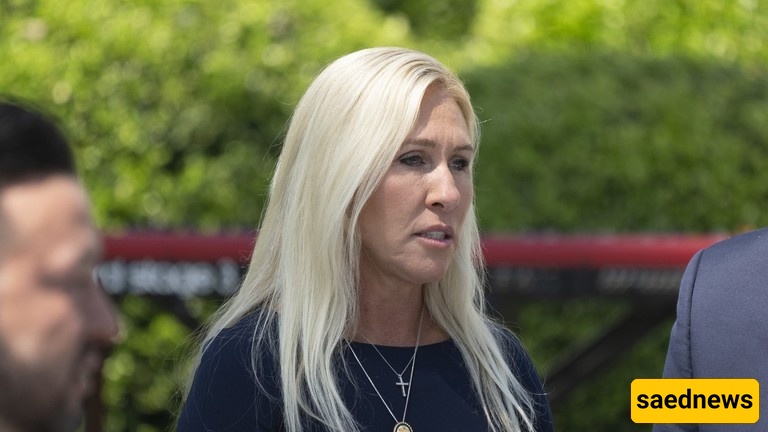SAEDNEWS: While the White House insists on the necessity of continuing aid to Ukraine in its war against Russia, some Republican members of the U.S. Congress view this support as a betrayal of American taxpayers’ interests.

According to Saed News Agency citing Russia Today, in the latest wave of intra-party criticism and political clashes over aid to Ukraine, Lauren Boebert, Republican representative from Colorado, stated bluntly:
“Funding the war in Ukraine is a betrayal of the majority of the American people.”
She made these remarks at a public meeting, emphasizing that the U.S. government should reconsider its priorities and redirect the budget sent abroad—especially to Kyiv—toward solving domestic issues such as the migration crisis, inflation, and the opioid epidemic.
These statements come as the U.S. has allocated over $175 billion in military, financial, and humanitarian aid to Ukraine since Russia’s invasion in February 2022. Now, more than two years into the conflict, some politicians and the American public are growing weary, raising tough questions about the effectiveness of this assistance.
Shift in Public Opinion and Internal Political Divide
Recent polls in the United States indicate declining public support for endless aid to Ukraine. Among Republican voters in particular, more than half now believe the government should reduce or stop assistance. Boebert, a prominent figure of the far-right faction within the Republican Party, represents this emerging discourse in Congress—one that no longer uniformly supports Kyiv as it did in 2022.
She asserted in her remarks:
“We pay taxes to secure our own borders, not Europe’s. Why should American taxpayers’ money be spent on a war whose victory is not guaranteed and whose end is uncertain?”
Inside Congress: The Battle Over Budget and Geopolitical Interests
These statements are not merely political controversy; they reflect a serious crisis among American lawmakers. In recent months, multiple attempts to pass new aid packages for Ukraine have faced resistance from the conservative wing of the House of Representatives. Speaker Mike Johnson, who is trying to balance between the moderate and far-right factions of the party, is under intense pressure.
Democrats and the Biden administration argue that aiding Ukraine is an investment in U.S. national security. From their perspective, a Ukrainian victory or even steadfast resistance could prevent further Russian aggression in Europe. However, critical Republicans contend that this logic no longer holds: “How much longer must we pay before realizing this is not our war?”
Ukraine’s Tragedy in U.S. Domestic Politics
Perhaps the most complex aspect of this confrontation is that the fate of a war-torn country—Ukraine—has effectively become hostage to Washington’s internal political battles. As long as the Republican Party remains embroiled in internal crises over leadership and priorities, passing any new aid to Kyiv will face growing difficulties.
Some observers warn that Ukraine may become a casualty of the 2024 election rivalry. Given the potential return of Donald Trump to power and his outspoken opposition to foreign aid, Kyiv is deeply concerned about the future of U.S. financial and military support.
In his recent campaign promises, Trump pledged that if elected, he would “end the Ukraine war within 24 hours”—a vague statement but one that is alarming for NATO allies and Ukrainian officials alike.
Economy, Borders, and War: Shifting Priorities in the U.S.
At the core of critics’ arguments against aid to Ukraine are America’s domestic challenges. High inflation, the immigration crisis at the southern borders, a housing market slowdown, and rising national debt are all cited as reasons why the government should shift its focus from “abroad” to “at home.”
Boebert added:
“If we can’t guarantee the security of our own cities, why should we fight for Kyiv’s security?”
Such statements resonate particularly with white working-class voters in the southern and midwestern states. They often hold priorities that differ from Washington’s political elite and view the focus on foreign policy as a neglect of their everyday concerns.
International Consequences: Waiting for a Signal from Washington
Meanwhile, Ukrainian officials worry that any shift in U.S. policy could quickly alter the balance of power on the front lines. Without advanced U.S. military aid—from artillery to air defense systems like the Patriot—Ukraine’s capacity to resist Russia would sharply decline.
Europeans, although providing some assistance, cannot carry the full burden of supporting Ukraine alone. Therefore, any talk from Washington about stopping or reducing aid directly impacts the battlefield and the morale of Ukrainian forces.
Conclusion: A Test of Resolve or a Reassessment of Priorities?
The debate over aid to Ukraine is no longer just a geopolitical issue; it has become a reflection of deeper divides in American society and politics. Representatives like Lauren Boebert voice a segment of the population demanding a shift in U.S. foreign policy—from international commitments to a focus on domestic problems.
The question now is whether the Biden administration and its allies can convince public opinion and Congress that continuing support for Ukraine still aligns with U.S. national interests—or if war fatigue, economic concerns, and right-wing pressures will ultimately force the United States to withdraw from one of its most significant fronts against Russia.

